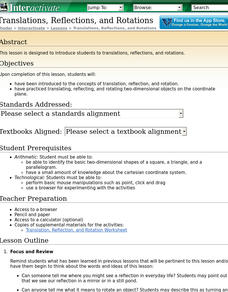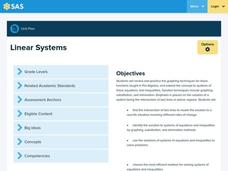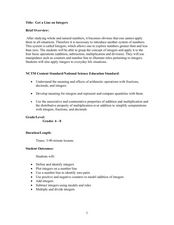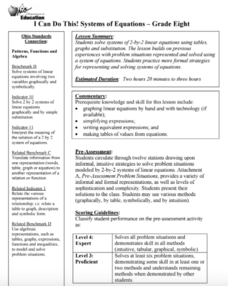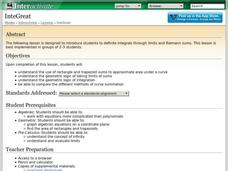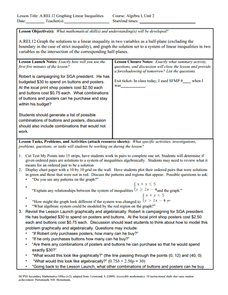Curated OER
Quadratic Relation and Parabola
Students identify the vertex and intercepts of a parabola. In this algebra lesson, students graph parabolas and factor quadratic equations. They perform transformation on the parabolas.
Curated OER
Integers
Students perform order of operation using integers. In this algebra instructional activity, students apply properties of integers as they add, subtract, multiply and divide integers. They work in groups to complete a RAFT assignment.
Curated OER
Guess My Rule
Students drill on math patterns, functions and Algebra. They construct and use tables to solve problems associated with mathematical relationships and identify a rule/equation. Students comprehend input/output to determine the...
National Security Agency
A Balancing Act: Solving Multi-Step Equations
Wow! Put on that thinking cap and solve multi-step equations. To solve equations, learners review the use of the distributive property and combining like terms. This three-day instructional activity comes with about 20 pages of...
Curated OER
Adding and Subtracting Integers
Students add and subtract integers. In this algebra activity, students add, subtract, multiply and divide integers. They apply the properties of numbers as they solve equations.
Curated OER
Translations, Reflections, and Rotations
Tenth graders have been introduced to the concepts of translation, reflection, and rotation, and have practiced translating, reflecting, and rotating two-dimensional objects on the coordinate plane.
Curated OER
Linear Systems
Students solve and graph linear equations. For this algebra lesson, students solve systems of equations using elimination and substitution. They graph their answer and identify the point of intersection.
Curated OER
Investigating Linear Equations Using Graphing Calculator
Students investigate linear equations using the Ti-Calculator. In this algebra lesson, students graph lines and identify the different quadrants on a coordinate plane. They identify ordered pairs used to plot lines.
Curated OER
Bridge Design and Bridge Building
Seventh graders conduct an investigation into the design of bridges and their construction. Students design bridges and draw detailed plans. For assessment they construct a model of a bridge that is made entirely of toothpicks. Students...
Curated OER
Subtracting Fractions
Students investigate the concept of subtracting fractions. They use a variety of problems in order to practice new skills. The independent practice is used to obtain an informal measurement of mastery with the use of a formal quiz for a...
Curated OER
Using Math with Sale Papers
Fifth graders estimate their results and then prove through calculations. In this math lesson, 5th graders solve problems using multiplication, division, addition, and subtraction. They also use mental math to solve their problems.
Curated OER
Definition Of The Derivative
High schoolers engage in a lesson plan that is concerned with the concept of a derivative. They define the concept of a derivative and then complete an assignment that is included in the lesson plan. Students then graph the derivative...
National Security Agency
Growing Patterns: Practical Pattern Problems
Your learners explore growing patterns by describing, extending, creating, and evaluating practical pattern problems in this three-day collaborative unit. Beginning with concrete patterns and function tables to extend and describe with a...
Curated OER
Get a Line on Integers
Students explore number sense by completing math function problems in class. In this integers lesson, students define integers and practice plotting them on a number line. Students utilize math functions such as addition and...
Kenan Fellows
Isotopic Pennies
Many people confuse atomic mass and atomic numbers. The sixth of seven lessons in a unit requires scholars to find the weight of different groups of pennies. Then, they must solve how many of each type of penny exists in a closed system...
Ohio Department of Education
I Can Do This! Systems of Equations
Use tables, graphs, and substitution to solve systems of linear equations. An envelope of sample problems is passed around the classroom, and each learner has the opportunity to solve the system in the envelope. This is a great way to...
EduGAINs
Introduction to Solving Linear Systems
Word problems offer class members an opportunity to learn the concept of solving linear systems using graphs. Individuals choose a problem based upon preferences, break into groups to discuss solution methods and whether there is...
Shodor Education Foundation
InteGreat
Hands-on investigation of Riemann sums becomes possible without intensive arithmetic gymnastics with this interactive lesson plan. Learners manipulate online graphing tools to develop and test theories about right, left, and midpoint...
Curated OER
Graphing Linear Inequalities
Eighth graders extend skills for representing and solving linear equations to linear inequalities. Lesson activities build understanding and skill by plotting ordered pairs of numbers that either satisfy or do not satisfy a given...
Curated OER
Describing Patterns
Fourth graders investigate repeating and growing patterns. Models, graphs and words are used to describe, extend and represent patterns. Students use evidence from models and graphs to support the identification of patterns.
Curated OER
Super Sort
Students sort objects based on one characteristic. They define the term "attribute" and give examples of attributes of objects. Students explain their reasoning for sorting objects into groups.
Curated OER
Shape Detectives
Students become "shape detectives" as they identify, name, create and describe common shapes within pictures and objects found within the learning environment. Suggestions include incorporating shapes into all learning areas and daily...
Curated OER
Computer Graphing Calculator Explorations
Students explore the graphing calculator feature on the Macintosh computer to explore some "parent" functions and their translations, combinations, and composites.
Curated OER
Exploring Function Graphs
Tenth graders investigate three different sets of data that relate temperature to another variable in the physical world. These illustrate linear, inverse and exponential relationships.







